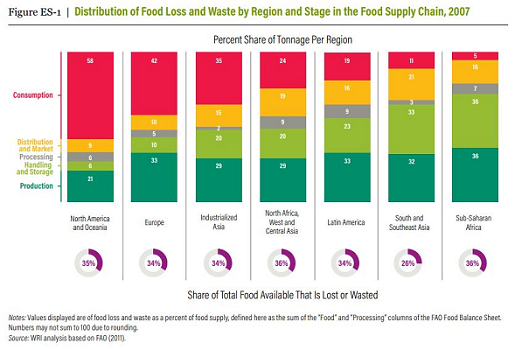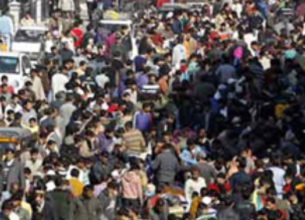“REDUCING FOOD LOSS AND WASTE: SETTING A GLOBAL ACTION AGENDA”
03, Sep 2019

Prelims level : Reports & Indices
Mains level : GS-II- Issues relating to Poverty and Hunger.
Why in News?
- A new report by the World Resources Institute (WRI) with the support of the Rockefeller Foundation has quantified global food wastage — nearly one-third of the food that is produced each year goes uneaten, costing the global economy over $940 billion.
- The uneaten food is responsible for emitting about 8 per cent of planet-warming greenhouse gases into the atmosphere, said the report.
- It put forward a Global Action Agenda that calls on governments, companies, farmers and consumers to collectively overcome “the world’s food loss and waste problem.”
Key Takeaways from The Report:
- In the new report experts explain how tackling the issue of food loss and waste can ultimately generate a “triple win.” According to the report, implementing reduction efforts can help farmers, companies and households save money; combat hunger; and alleviate pressure on climate, water and land.
- The report highlights the food loss and waste challenge, the cause of the issue, what should be done to address it, what progress has been made so far and more.
- It also outlines a Global Action Agenda, encouraging countries and companies to adopt the United Nations Sustainable Development Goals as their own, measure their food loss and waste, take action on identified hotspots, identify a shortlist of to-dos for each type of actor in the food supply chain and scale up the impact and pace of these actor-specific interventions.
Reduction as a Strategy:
- Many areas across the globe are setting sustainability goals, including food loss and waste reduction goals and greenhouse gas emissions reduction goals. Experts mention in the report that reduction can be a strategy to achieving these set goals.
- Reducing food loss and waste can improve hunger, poverty and health, ultimately helping to create a sustainable food future and to fix an inefficient food system for the sake of people and the planet, the report points out.

Why Food Loss and Waste Matters?
- Reduction of food loss and waste can have a significant impact on the environment, economy, food security, job market and ethics, according to the report.
- For example, food loss and waste reduction can help slash greenhouse gas emissions, combat hunger across the globe, create jobs across the supply chain and help change behaviour and habits for the better.
- Additionally, reduction can help meet the United Nations Sustainable Development Goals by 2030, contribute to the Paris Agreement on climate change and sustainably feed the planet by 2050, the report points out.
The Cause of Food Loss and Waste:
- The report points to “direct causes” of food loss and waste, such as concerns about a food’s safety or suitability, and “underlying drivers,” which can be technological, managerial, behavioural or structural in nature.
- Altogether, there are 15 underlying drivers that need to be addressed if food loss and waste is to be successfully reduced:
- Poor infrastructure
- Inadequate equipment
- Suboptimal packaging
- Inadequate food management practices, skills or knowledge
- Inflexible procurement practices
- Poor supply and Demand Forecasting and Planning
- Marketing strategies
- Norms and attitudes
- Lack of awareness
- Concerns about possible risks
- Conditions in Demographics
- Climate
- Policies and Regulations
- Economics
- Financing
- It’s important to note that some underlying drivers are more prominent in certain regions and that food loss and waste is often driven by more than one driver.
What Action Needs to be Taken?
- The report states that governments and companies should pursue a simple but effective “Target-Measure-Act approach” when it comes to reducing food loss and waste. Here’s a breakdown of what that means:
- Set Targets. Targets set ambition, and ambition motivates action.
- Measure food loss and waste. Measuring food loss and waste can help decision-makers better understand how much, where and why food is being lost or wasted. Understanding the problem can help you overcome it and keep you on track to meet your goals.
- Take action. Create a priority to-do list for each type of actor to get started with reducing food loss and waste. Then, take action to put that list into motion.
10 Scaling Interventions:
- To help accelerate and broaden the deployment of the Target-Measure-Act approach and the actor-specific interventions, the report highlights 10 scaling interventions:
- Develop national strategies for reducing food loss and waste.
- Create national public-private partnerships.
- Launch a “10x20x30” supply chain initiative, where at least 10 corporate “power players” commit to Target-Measure-Act and then engage their own 20 largest suppliers to do the same and achieve a 50 percent reduction in food loss and waste by 2030.
- Invigorate efforts to strengthen value chains and reduce smallholder losses.
- Launch a “decade of storage solutions.”
- Shift consumer social norms.
- Go after greenhouse gas emissions reductions.
- Scale up financing.
- Overcome the data deficit.
- Advance the research agenda.









